Money Lessons for Kids
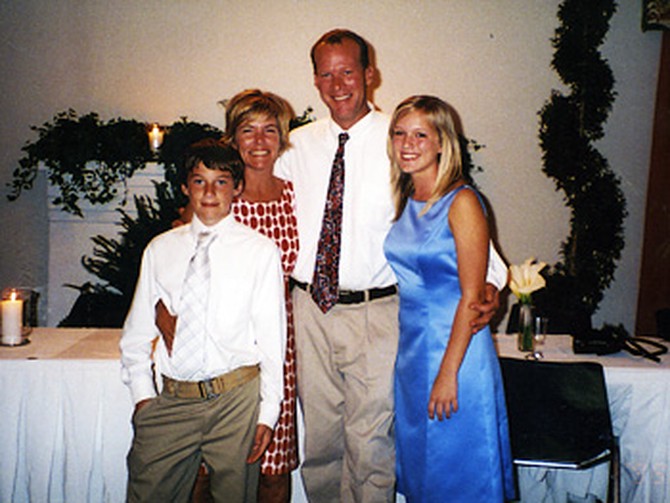
While reading The New York Times, an article called "The Frugal Teenager, Ready or Not," caught Oprah's attention. The writer discussed parents who, for the first time in years, are saying no to their children and cutting back on frivolous spending. As the economic crisis begins to hit home, millions of overindulged children are being forced to live without designer clothes, the latest techno-toys and big birthday bashes.
Wendy and Paul Postle, parents featured in the New York Times article, say they've realized always saying yes to their two children could cost them their future.
Just a few years ago, Wendy admits that she and her husband indulged their teenagers, Kaitlyn and Zach, in many ways. "It made me proud to give them what they wanted," Paul says. "I guess as parents, you try to give them things that you didn't have."
Most years, Paul says the kids' birthdays were celebrated with over-the-top parties. A video of Zach's first birthday shows a baby surrounded by gifts that he couldn't even open. "It's a perfect example of how we overdid parties," Wendy says.
Paul says he and his family lived like their luck—and money—would never run out. "It was a lifestyle of you know, 'Don't worry, we'll get more,' meaning money," he says. "The times were good, and there could be no fall."
Wendy and Paul Postle, parents featured in the New York Times article, say they've realized always saying yes to their two children could cost them their future.
Just a few years ago, Wendy admits that she and her husband indulged their teenagers, Kaitlyn and Zach, in many ways. "It made me proud to give them what they wanted," Paul says. "I guess as parents, you try to give them things that you didn't have."
Most years, Paul says the kids' birthdays were celebrated with over-the-top parties. A video of Zach's first birthday shows a baby surrounded by gifts that he couldn't even open. "It's a perfect example of how we overdid parties," Wendy says.
Paul says he and his family lived like their luck—and money—would never run out. "It was a lifestyle of you know, 'Don't worry, we'll get more,' meaning money," he says. "The times were good, and there could be no fall."
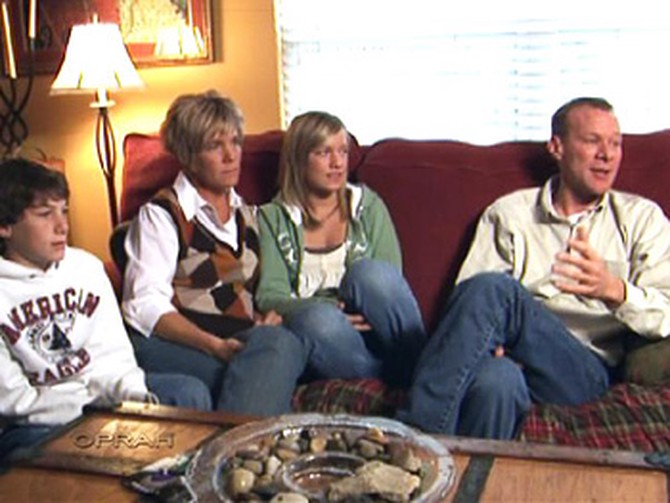
Unfortunately, the good times didn't last. Like millions of families across the country, the Postles saw the price of gas, water, electricity and groceries climb as stock prices fell. Wendy says they began exceeding their household budget, which meant they had to start cutting back in other areas.
Paul and Wendy made the decision to share their bills with the children, who didn't understand why they couldn't buy everything they wanted. "I wanted them to realize it's a lot harder to stay solvent these days," Wendy says. "I wanted Zach to see how much we pay for the home that we live in, and when he first saw the mortgage bill, he thought it was a year[ly] payment." Thirteen-year-old Zach says he was amazed by how much the home costs every month.
To save money, every member of the family has had to make sacrifices. Instead of buying new clothes at the mall, 15-year-old Kaitlyn now shops at thrift stores with her mom...a change that wasn't well received at first. "When my parents first started telling me, 'No, we can't get it at the mall. Let's go to the thrift store,' at first, it sucked," she says. "When I see all my friends with these really expensive, newer items, it makes me feel poor, and it makes me feel a little angry because I grew up hearing yes all the time."
After seeing how much money is coming into the home and how much is going out, Kaitlyn says she's started to think more about her family's financial situation. "I've started to worry about what is going to happen to us next," she says.
Paul and Wendy made the decision to share their bills with the children, who didn't understand why they couldn't buy everything they wanted. "I wanted them to realize it's a lot harder to stay solvent these days," Wendy says. "I wanted Zach to see how much we pay for the home that we live in, and when he first saw the mortgage bill, he thought it was a year[ly] payment." Thirteen-year-old Zach says he was amazed by how much the home costs every month.
To save money, every member of the family has had to make sacrifices. Instead of buying new clothes at the mall, 15-year-old Kaitlyn now shops at thrift stores with her mom...a change that wasn't well received at first. "When my parents first started telling me, 'No, we can't get it at the mall. Let's go to the thrift store,' at first, it sucked," she says. "When I see all my friends with these really expensive, newer items, it makes me feel poor, and it makes me feel a little angry because I grew up hearing yes all the time."
After seeing how much money is coming into the home and how much is going out, Kaitlyn says she's started to think more about her family's financial situation. "I've started to worry about what is going to happen to us next," she says.

Despite the sacrifices and shrinking savings, Wendy says the economic crisis is one of the best things that's happened to her family. "It has brought us closer, in a way," she says. "Kaitlyn and I go to the thrift store together now. She likes it, and so that's spending time."
Wendy says they also rent movies now instead of going to the theater, which gives them more time to talk at home. "I think it's taught all of us, including my husband and I, that it's not the material things that matter," she says.
Since they started tightening their belts, Paul says his family feels more united. "Instead of hustling all different directions—Kaitlyn to her friends, to the movies and [asking for] money for that—it's scaling back," he says.
Kaitlyn speaks for many teens when she says the new spending restrictions "suck." "I mean, you're used to getting everything you want, and then, all of a sudden it's gone," she says.
Though Kaitlyn and Zach may get angry and frustrated at times, both say they've enjoyed spending more time together as a family.
Wendy says they also rent movies now instead of going to the theater, which gives them more time to talk at home. "I think it's taught all of us, including my husband and I, that it's not the material things that matter," she says.
Since they started tightening their belts, Paul says his family feels more united. "Instead of hustling all different directions—Kaitlyn to her friends, to the movies and [asking for] money for that—it's scaling back," he says.
Kaitlyn speaks for many teens when she says the new spending restrictions "suck." "I mean, you're used to getting everything you want, and then, all of a sudden it's gone," she says.
Though Kaitlyn and Zach may get angry and frustrated at times, both say they've enjoyed spending more time together as a family.
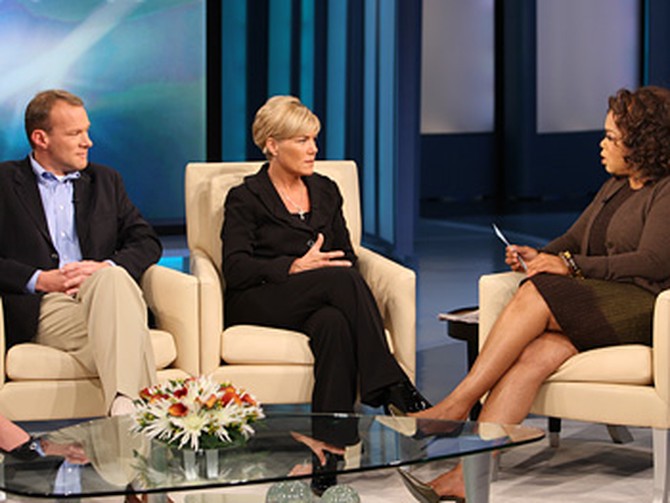
As Oprah learned during a discussion with Gayle King, Mark Consuelos and Ali Wentworth, many parents are opposed to talking about income and expenses with their children. What made Wendy and Paul share their financial statements with Kaitlyn and Zach? Wendy says when her teens said things like, "We're poor," she and Paul were insulted.
"I think the kids needed to realize we, first of all, are way better [off] than a lot of other families. They do not go without anything that they truly need," she says. " I think we just really needed to show them how hard we work. ... We work for the house we're in and the neighborhood that we live in and the schools that they go to. I thought it was important that they see what we're doing and providing for them."
Since having an honest conversation about money, Paul says he feels better. "It's more controlled chaos," he says.
While Kaitlyn may not like the situation much, her dad says that's okay. "I think it's a learning experience for her," he says. "It's a part of life at any age."
"I think the kids needed to realize we, first of all, are way better [off] than a lot of other families. They do not go without anything that they truly need," she says. " I think we just really needed to show them how hard we work. ... We work for the house we're in and the neighborhood that we live in and the schools that they go to. I thought it was important that they see what we're doing and providing for them."
Since having an honest conversation about money, Paul says he feels better. "It's more controlled chaos," he says.
While Kaitlyn may not like the situation much, her dad says that's okay. "I think it's a learning experience for her," he says. "It's a part of life at any age."

Financial expert Suze Orman says now is best time to start teaching your children about money. Today's teens are struggling with spending limits because of parents' past mistakes. "A few years ago, when they were a lot younger, the stock market was going up. Real estate was going up. Everybody felt wealthy," Suze says. "So [parents] kept thinking, 'I can say yes.'"
After years of saying yes, the stock market plummeted and some parents lost their jobs. This is why Suze says yes and no should never depend on the economy. "It should be dependent upon: 'What kind of values do you want to raise your children with? Do you always want them to think they're entitled? Or do you want them to understand the value of a buck?'" she says.
Once your son or daughter understands basic math principles, Suze says it's time to start the conversation. "You have got to start talking about money. You've got to," she says. "There's nothing wrong with talking about money. I happen to love it, and I happen to love talking about it."
After years of saying yes, the stock market plummeted and some parents lost their jobs. This is why Suze says yes and no should never depend on the economy. "It should be dependent upon: 'What kind of values do you want to raise your children with? Do you always want them to think they're entitled? Or do you want them to understand the value of a buck?'" she says.
Once your son or daughter understands basic math principles, Suze says it's time to start the conversation. "You have got to start talking about money. You've got to," she says. "There's nothing wrong with talking about money. I happen to love it, and I happen to love talking about it."
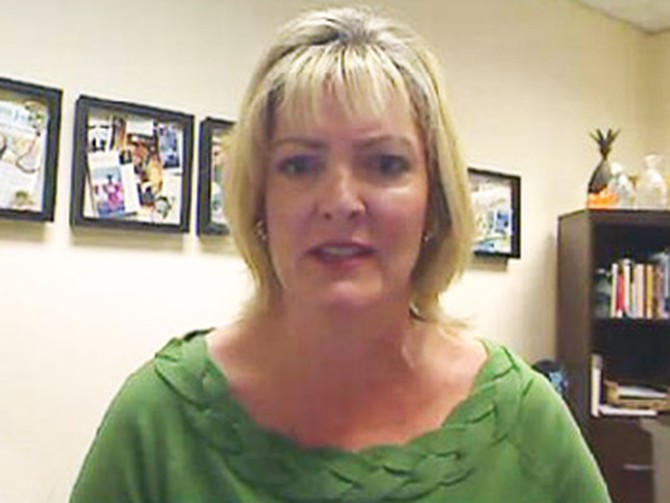
Deidre, joining via Skype™ from Seattle, has a question for Suze about her three kids—ages 15, 13 and 9. "Sometimes I feel like an ATM machine. I just don't know how to say no to them," she says. "We set up an allowance system, but they tend to run out of money every week and they ask for more—and I end up giving in more than I would like to."
With teens in the house, Deidre says she's afraid it already might be too late to start talking honestly about money.
Suze says Deidre's kids almost certainly already sense that something is wrong in their home, but they might not know the actual cause. By not talking about the financial state of their family and continuing to buy things they can't afford, Deidre is participating in a "silent conversation," Suze says.
"The conversation has already started with her. Kids do what you do; they don't listen to what you say," Suze says. "What Deidre needs to understand is that it's never too late to have the conversation about money."
Suze says when you have this discussion with your kids, you must remain calm and in control. If you're scared or tense, your kids instinctively will pick up on those feelings. "Don't make it like, 'Oh my God, the sky is falling,'" Suze says. "Make it like, 'Isn't this great that we get to talk about it? And we get to work through this together.'"
With teens in the house, Deidre says she's afraid it already might be too late to start talking honestly about money.
Suze says Deidre's kids almost certainly already sense that something is wrong in their home, but they might not know the actual cause. By not talking about the financial state of their family and continuing to buy things they can't afford, Deidre is participating in a "silent conversation," Suze says.
"The conversation has already started with her. Kids do what you do; they don't listen to what you say," Suze says. "What Deidre needs to understand is that it's never too late to have the conversation about money."
Suze says when you have this discussion with your kids, you must remain calm and in control. If you're scared or tense, your kids instinctively will pick up on those feelings. "Don't make it like, 'Oh my God, the sky is falling,'" Suze says. "Make it like, 'Isn't this great that we get to talk about it? And we get to work through this together.'"

From her bridal boutique in Roseville, California, Lori asks if she should give her 10-year-old daughter an allowance of $20 a month. "I read a recent article that said to give allowance not based on chores, but based on the fact that they're a part of your household," Lori says. "I was wondering from Suze, how much I should give her and what would be an appropriate amount for a 10-year-old?"
Suze thinks the article Lori read is wrong. "You get an allowance simply because you live in a household? No! Money has to be earned," she says.
Based on the federal minimum wage of $6.50 an hour, Suze calculates that each minute of work is worth roughly 10 cents. It will take about four hours of work to earn the $20 Lori's daughter wants. Suze says this is a good level to start a child's wages. "Now if they do that job efficiently, you can give them a pay raise. If they do not do that job efficiently, ... I would actually decrease their salary, so that the kids understand good work equals good pay equals job promotion. Bad work equals getting fired," she says. "And when they learn that at 8, 9, 10, now what are we talking about? We have a kid that knows they have to work for something."
What kinds of work can Lori's 10-year-old do to earn her wages? Is cleaning up her room or making her bed enough? Yes, Suze says these are good tasks for a kid as long as it helps her parents. "You guys have to decide together what helps you really around the house," she says.
Suze thinks the article Lori read is wrong. "You get an allowance simply because you live in a household? No! Money has to be earned," she says.
Based on the federal minimum wage of $6.50 an hour, Suze calculates that each minute of work is worth roughly 10 cents. It will take about four hours of work to earn the $20 Lori's daughter wants. Suze says this is a good level to start a child's wages. "Now if they do that job efficiently, you can give them a pay raise. If they do not do that job efficiently, ... I would actually decrease their salary, so that the kids understand good work equals good pay equals job promotion. Bad work equals getting fired," she says. "And when they learn that at 8, 9, 10, now what are we talking about? We have a kid that knows they have to work for something."
What kinds of work can Lori's 10-year-old do to earn her wages? Is cleaning up her room or making her bed enough? Yes, Suze says these are good tasks for a kid as long as it helps her parents. "You guys have to decide together what helps you really around the house," she says.
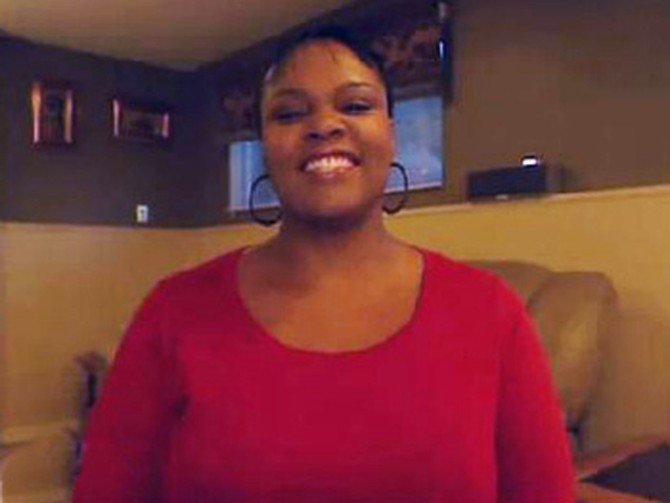
Ericka in Renton, Washington, says she sees advertisements and signs marketing credit cards for teenagers. "I want to know: Is my 17-year-old daughter responsible enough for a credit card?" she asks.
Suze says the only person who can answer that question is Ericka. "Is your daughter seriously showing responsibility right now when it comes to money? Yes or no, please," Suze says.
"No," Ericka says.
For parents with a child who is not yet ready for the responsibility of managing a credit card alone, Suze says there is a way to teach them.
First, the kids must agree to pay the entire credit card balance every month. "Whatever they charge, they'd better pay off in full," Suze says. "There is no carrying a balance. No minimum payment."
Suze's second stipulation is that parents must agree to supervise their kids' monthly credit card payments. "They send the payment to you one or two weeks before it is due. You turn around and make the payment on the credit card so they don't ruin their FICO score without knowing about it. That way you know if you have a responsible child or not. If you do, then you can finally let them be on their own," Suze says to Ericka. "You already know your daughter's not responsible yet. So be careful, girlfriend."
Do you know the dirty truth about credit cards? Take Suze's quiz.
Suze says the only person who can answer that question is Ericka. "Is your daughter seriously showing responsibility right now when it comes to money? Yes or no, please," Suze says.
"No," Ericka says.
For parents with a child who is not yet ready for the responsibility of managing a credit card alone, Suze says there is a way to teach them.
First, the kids must agree to pay the entire credit card balance every month. "Whatever they charge, they'd better pay off in full," Suze says. "There is no carrying a balance. No minimum payment."
Suze's second stipulation is that parents must agree to supervise their kids' monthly credit card payments. "They send the payment to you one or two weeks before it is due. You turn around and make the payment on the credit card so they don't ruin their FICO score without knowing about it. That way you know if you have a responsible child or not. If you do, then you can finally let them be on their own," Suze says to Ericka. "You already know your daughter's not responsible yet. So be careful, girlfriend."
Do you know the dirty truth about credit cards? Take Suze's quiz.

Skyping from Indianapolis, Jean says her son soon will have an opportunity to travel to Costa Rica with some of his fifth-grade classmates for a Spanish language immersion experience—a trip he has known about since kindergarten. "Right now we can't afford it. How can we make this happen for him?" Jean says. "Should we be able to take out a loan?"
Suze asks about their debt. Jean says they have about $20,000 of credit card debt. And how much is the trip? "About $2,200 to $2,500," Jean says.
Even though Jean's son will be disappointed, Suze has bad news. "If you ask me, a good parent is somebody who has enough money to make sure that the kids can always eat, they provide shelter for them, there's money in case they get sick. If you take this money as a loan to send your kid away and now you lose your job, something happens, what's the kid going to think?" Suze says. "I wouldn't be doing it if I were you. Honest to God, I think you'll be making a serious mistake. $20,000 in credit card debt? I don't think so."
If Jean does decide to take out that loan to send her son on the trip, Suze says she will be teaching him a powerful message...just not a good one. "She's teaching him to live a financial lie, because Mom is living a financial lie," Suze says. "Love your children. Don't reward them with money. Reward them with honesty and love—that's what this is all about."
Suze asks about their debt. Jean says they have about $20,000 of credit card debt. And how much is the trip? "About $2,200 to $2,500," Jean says.
Even though Jean's son will be disappointed, Suze has bad news. "If you ask me, a good parent is somebody who has enough money to make sure that the kids can always eat, they provide shelter for them, there's money in case they get sick. If you take this money as a loan to send your kid away and now you lose your job, something happens, what's the kid going to think?" Suze says. "I wouldn't be doing it if I were you. Honest to God, I think you'll be making a serious mistake. $20,000 in credit card debt? I don't think so."
If Jean does decide to take out that loan to send her son on the trip, Suze says she will be teaching him a powerful message...just not a good one. "She's teaching him to live a financial lie, because Mom is living a financial lie," Suze says. "Love your children. Don't reward them with money. Reward them with honesty and love—that's what this is all about."

When it comes to helping your children become financially secure adults, Suze says there are five things every parent should know.
1. Start talking about money. "Open up the conversation," Suze says. "As we said earlier, kids do as you do. Not as you say. So for you, you now have to open up the conversation with your actual actions."
2. Teach your kids to value money. It's hard for kids to grasp how much you're actually paying for items when you do so with a credit or debit card, Suze says. Kids need to see something more concrete. "Start paying for things in cash. That's what you really need to do," Suze says.
3. Don't reward your children with money. An A on the report card doesn't equal $50, Suze says. "Love them. Spend time with them," she says. "[They'll say:] 'I got an A. I get to go out with Mommy and Daddy. I get to spend time.' Teach your children the value of a personal relationship—not that everything comes down to money."
4. Be an example for your children. "Kids do as you do, not as you say. And don't think that they don't watch everything that you do," Suze says. "Don't tell them you can afford something when you can't. All kids want from you is honesty. All this world wants from you is honesty. And all you should want from yourself is honesty."
5. Teach your kids to prioritize. Sure, kids may want everything, but Suze advises to have them sit down and make a list of what they want the most. "If they still want it a month from then, let them come back to you, but prioritize. What is really important?" she says. "And Mom and Dad, help them prioritize—what do you need versus what you want? And out of all the things you want, what's the most important thing that you want?"
1. Start talking about money. "Open up the conversation," Suze says. "As we said earlier, kids do as you do. Not as you say. So for you, you now have to open up the conversation with your actual actions."
2. Teach your kids to value money. It's hard for kids to grasp how much you're actually paying for items when you do so with a credit or debit card, Suze says. Kids need to see something more concrete. "Start paying for things in cash. That's what you really need to do," Suze says.
3. Don't reward your children with money. An A on the report card doesn't equal $50, Suze says. "Love them. Spend time with them," she says. "[They'll say:] 'I got an A. I get to go out with Mommy and Daddy. I get to spend time.' Teach your children the value of a personal relationship—not that everything comes down to money."
4. Be an example for your children. "Kids do as you do, not as you say. And don't think that they don't watch everything that you do," Suze says. "Don't tell them you can afford something when you can't. All kids want from you is honesty. All this world wants from you is honesty. And all you should want from yourself is honesty."
5. Teach your kids to prioritize. Sure, kids may want everything, but Suze advises to have them sit down and make a list of what they want the most. "If they still want it a month from then, let them come back to you, but prioritize. What is really important?" she says. "And Mom and Dad, help them prioritize—what do you need versus what you want? And out of all the things you want, what's the most important thing that you want?"

Every year, millions of parents celebrate their children's high school graduations with parties or presents, but Dan Kadlec gave his oldest daughter what could be one of the best gifts she'll ever receive—a letter about finances.
"I worry a lot about my kids as they get ready to be sent off into the world, especially when it comes to money," he says. "I thought maybe I could get her to listen to some final tips from the old man."
Read Dan's letter to Lexie.
Dan, a columnist for Money magazine, says kids today don't learn much about personal finance in high school. "In high school, you've got reading, writing, arithmetic. You need a fourth R. You need reality," he says. "And reality needs to be about money, mortgages, investments, credit cards...you know, the whole range."
One of Dan's lessons for Lexie is to live within her means—an especially important tip for kids who are about to be bombarded with countless credit card offers. Dan says the average credit card balance for a college senior is $3,000. "These college kids especially are fresh meat for the creditor predators, if you will. If you can't live within your means, you're going to run up bills instantly," he says. "They get that credit card. ... They see their limit, and it looks like free money to them."
Dan says having a credit card doesn't have to be a bad thing—you just need to know how to use it. "You just look at them and you say, 'Why do these credit card companies keep bombarding someone with no income?'" he says. "The answer is they're in it for the long run. They want to hook you early, and we've seen studies that show the first credit card you own you still have 15 years later."
"I worry a lot about my kids as they get ready to be sent off into the world, especially when it comes to money," he says. "I thought maybe I could get her to listen to some final tips from the old man."
Read Dan's letter to Lexie.
Dan, a columnist for Money magazine, says kids today don't learn much about personal finance in high school. "In high school, you've got reading, writing, arithmetic. You need a fourth R. You need reality," he says. "And reality needs to be about money, mortgages, investments, credit cards...you know, the whole range."
One of Dan's lessons for Lexie is to live within her means—an especially important tip for kids who are about to be bombarded with countless credit card offers. Dan says the average credit card balance for a college senior is $3,000. "These college kids especially are fresh meat for the creditor predators, if you will. If you can't live within your means, you're going to run up bills instantly," he says. "They get that credit card. ... They see their limit, and it looks like free money to them."
Dan says having a credit card doesn't have to be a bad thing—you just need to know how to use it. "You just look at them and you say, 'Why do these credit card companies keep bombarding someone with no income?'" he says. "The answer is they're in it for the long run. They want to hook you early, and we've seen studies that show the first credit card you own you still have 15 years later."

Lexie's armed with good financial advice—so did she take it? She checks in over Skype™ from her college campus.
As a freshman, Lexie says there aren't as many opportunities to spend as she thought. "But I have been keeping a folder of all of my receipts for whatever I have been spending," she says. "I'm not sure what I'm going to do with those yet. I think me and my dad will go over that." Her major—international studies—also requires her to take an economics class, which she says she'll take next semester.
Much of the money Lexie made as a summer swim instructor, she says, is still in her bank account, but she's careful about what she spends. "Every time I need to spend my own money, I have to actually physically go to an ATM and take out the money. It's a little bit more of a hassle, so I don't spend as much as I think I would if I had access to a credit card," she says. "I also watch the money in my account go down each time I take out money, so I like having my money in there."
Now that she's on her own, Lexie says she appreciates her dad's advice. "I think it's going to make my transitioning after my senior year in college a whole lot easier. By having my dad not cut me off at all but give limits, as you said, when I'm going out getting a job, that sort of stuff, I'm going to have to manage with what I have and not with what my parents are giving me anymore."
As a freshman, Lexie says there aren't as many opportunities to spend as she thought. "But I have been keeping a folder of all of my receipts for whatever I have been spending," she says. "I'm not sure what I'm going to do with those yet. I think me and my dad will go over that." Her major—international studies—also requires her to take an economics class, which she says she'll take next semester.
Much of the money Lexie made as a summer swim instructor, she says, is still in her bank account, but she's careful about what she spends. "Every time I need to spend my own money, I have to actually physically go to an ATM and take out the money. It's a little bit more of a hassle, so I don't spend as much as I think I would if I had access to a credit card," she says. "I also watch the money in my account go down each time I take out money, so I like having my money in there."
Now that she's on her own, Lexie says she appreciates her dad's advice. "I think it's going to make my transitioning after my senior year in college a whole lot easier. By having my dad not cut me off at all but give limits, as you said, when I'm going out getting a job, that sort of stuff, I'm going to have to manage with what I have and not with what my parents are giving me anymore."
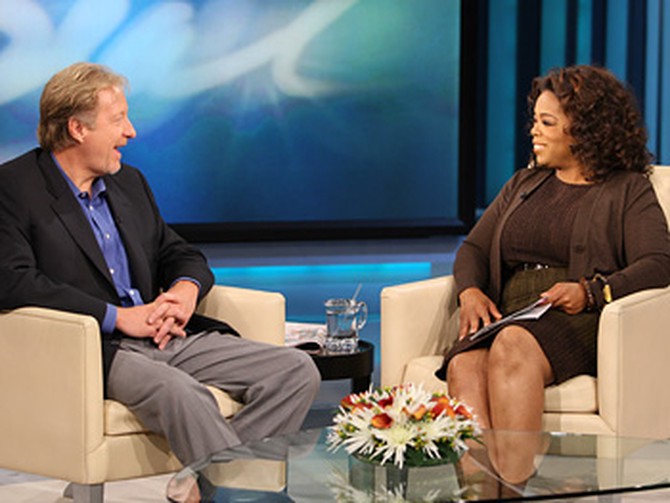
The best lesson Dan says he taught his children about money was giving them an allowance. "We made them stick to it. If they ran out of money, they ran out of money," he says.
Dan says he set up bank accounts with debit cards for each one of the kids. "I put a certain amount of money in every week. They had to make it last," he says. "The beauty of that system was they learned how to budget and how to live within their means. But, also, when I decided I wanted to give them something extra, it became fun again for me."
Learn more about how to teach your kids money lessons that will last a lifetime.
Dan says he set up bank accounts with debit cards for each one of the kids. "I put a certain amount of money in every week. They had to make it last," he says. "The beauty of that system was they learned how to budget and how to live within their means. But, also, when I decided I wanted to give them something extra, it became fun again for me."
Learn more about how to teach your kids money lessons that will last a lifetime.
Published 10/22/2008

